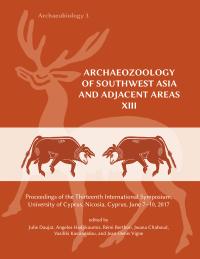Synopsis
Due to their location at the meeting point of the three Old World’s continents—Africa, Asia, and Europe—Southwest Asia and its adjacent areas played a pivotal role in the history of humanity. They received successive waves of our species—Homo sapiens—out of Africa. Different processes in several areas of this large region brought about the transition to the Neolithic, and later on the urban revolution, the emergence of empires bringing with them important subsequent religious, cultural, social, and political consequences. Southwest Asia also played a major role in the interactions between East (Asia) and West (Europe) during the last two millennia. The unique importance of Southwest Asia in the history of humanity is strengthened by the, also related to its location, fact that this area is a hotspot of biodiversity, especially in mammals, which were—as everywhere in the world—tightly associated to the history of civilizations in a diversity of roles: game, providers of meat and milk, traded raw material, symbol of prestige and wealth, pets, etc.
Chapters
Published
March 8, 2022Series
Categories
Copyright (c) 2022 Lockwood Press Online
Thursday, March 10, 2022
Archaeozoology of Southwest Asia and Adjacent Areas XIII: Proceedings of the Thirteenth International Symposium, University of Cyprus, Nicosia, Cyprus, June 7–10, 2017
Julie Daujat; Angelos Hadjikoumis; Remí Berthon; Jwana Chahoud; Vasiliki Kassianidou; Jean-Denis Vigne; Roger Alcàntara Fors; Josep Fortuny; Miquel Molist Montaña; Carlos Tornero; Maria Saña Seguí; Max Price; Jana Eger; Corina Knipper; Norbert Benecke; Jeremy A. Beller; Haskel J. Greenfield; Thomas E. Levy; Annie Brown; Aren M. Maeir; Günther Karl Kunst; Herbert Böhm; Rainer Maria Czichon; Mary C. Metzger; Elizabeth Ridder; Suzanne E. Pilaar Birch; Steven E. Falconer; Patricia L. Fall; Ursula R. Mutze; Wolfgang Müller; Mariola Hepa; Joris Peters; Selena Vitezović; Ivan Vranić; Scott J. Rufolo; Pam J. Crabtree; Jennifer Piro; Elena Maini; Antonio Curci; Sarieh Amiri; Marjan Mashkour; Azadeh F. Mohaseb; Reza Naseri; Eleonora Serrone; Simone Mantellini; Amriddin E. Berdimuradov; Sebastian Walter; Salima Ikram; Megan Spitzer; Laura Strolin; Jacqueline Struder; Michele Degli Esposti; Gábor Kalla; Lásló Bartosiewicz

No comments:
Post a Comment